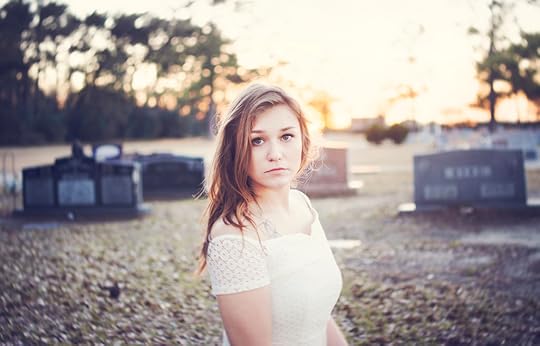Gabe Cole Novoa's Blog, page 70
December 26, 2014
Fixing the First Page Feature #6
 Photo credit: lauren rushing on FlickrOkay! So as per usual, I’ll start by posting the full first 250 excerpt, after which I’ll share my overall thoughts, then my redline critique. As always, I totally encourage you guys to share your own thoughts and critiques in the comments (because I’m only one person with one opinion!), as long as it’s polite, thoughtful, and constructive. Any rude or mean comments will be removed.
Photo credit: lauren rushing on FlickrOkay! So as per usual, I’ll start by posting the full first 250 excerpt, after which I’ll share my overall thoughts, then my redline critique. As always, I totally encourage you guys to share your own thoughts and critiques in the comments (because I’m only one person with one opinion!), as long as it’s polite, thoughtful, and constructive. Any rude or mean comments will be removed.Let’s get started!
Title: THREE GHOSTS FOR ANASTASIA
Category/Genre: YA Paranormal Romance
Excerpt:
“The little girl entered the bedroom, following her parents. Her little face was red and she tried to hold her tears when she saw her grandma lying in the bed, sleeping peacefully, while the color had already left her face.
‘Grandma…’ she whispered with broken voice and her mother brought a chair, making her sit near her grandmother’s side; she asked her to remain quiet and wait here, as patted her head.
‘Ok mommy, I will wait here.’ And she blew her nose.
‘That’s my girl, we will be right back.’ She said kissing her on the cheek, and she left the room.
It was quiet, really quiet, as if the sound had disappeared and the girl looked at her grandmother. She always smiled every time she and her parents visited her as also she used to tell the best stories and making cookies. In that thought new tears started to flow and the girl whipped them away.
‘No!’ the girl screamed but she realized that, on the spot he had cut, a faint glow, and then, a shining silver light appeared creating a small ball which was now floating above the dead woman’s body.
Suddenly the temperature fell drastically and the girl started to feel the chill down to her spine. Looking around her she realized that everything had become darker until she turned her eyes across the other side of the bed. A man dressed in black, tall with black hair and eyes stood above her grandmother’s body.”
Okay, interesting start. I’m curious about the spontaneously appearing man (grim reaper-type character, perhaps?). Writing-wise, there are a couple grammatical errors that I’ll adjust, but you may want to be careful because generally, when there are a lot of grammatical errors on the first page, it’s a sign that there are a lot of grammatical errors throughout (if this is a weakness of yours, critique partners can definitely help weed them out!). I was also a little confused about what happened between paragraph three and four—I felt like I was missing a paragraph, because there’s reference to “he” and a “cut” that seemed to come out of nowhere (maybe I am missing a paragraph?).
Plot-wise, I’m getting the sense that this is probably a prologue (deaths with mysterious figures on first pages are a pretty common prologue trope). You may want to be careful with this, if only because as I said before, this kind of opening/prologue is common, especially among YA Paranormals.
Finally, I’d also like to see more about the setting. We know about the bed, and the room is dark, but that’s about it. What kind of room is she in? Is it a small bedroom? A large hospital room? Are there any clues you can give us so we know where we are in time? Is it winter with little heating in the room, or winter with the heat blasting, or in the middle of summer with the room stifling? There’s a lot we don’t know, and I’d like to be able to have at least a little bit of a sense for where we are in place and time.
Now for the in-line critique:
“The little girl entered the bedroom, following her parents. Rather than starting with “the little girl,” which is really generic, I’d rather know our protagonist’s name (assuming she is our protagonist). Her little face was red (If you get rid of “the little girl” in the first sentence, then this is okay. If not, I’d reword to avoid the repetition of “little.”) and she tried to hold her tears when she saw her grandma lying in the bed, (“She saw” is an example of a filter phrase/“thought” verb. If you haven’t read Chuck Palahniuk’s article on “Thought” verbs, I highly recommend it (my CPs can attest to the fact that I throw this article at absolutely everyone, often more than once). The short version is this: filter phrases distance the reader from the narrative by placing an extra layer into the writing (with the “filter”), and thus, you can make your writing more immediate by removing them.) sleeping peacefully, while the color had already left her face. Whose face? The little girl’s, or the grandmother’s?
‘Grandma…’ she whispered with a broken voice and her mother brought a chair, making her sit near her grandmother’s side; she asked her to remain quiet and wait here, as she patted her head. This sentence is really long. I recommend breaking it up to make it easier to read.
‘Okay mommy, I will wait here.’ I don’t think you need the part I bolded. Most kids don’t repeat verbatim anyway, and the addition makes the dialogue sound a little stiff, to me. And she blew her nose. I don’t think you need the “and,” either.
‘That’s my girl, we will be right back.’ I recommend changing “we will” to “we’ll” to help the dialogue flow a little better. She said kissing her on the cheek, and she left the room.
It was quiet, really quiet, as if the sound had disappeared (As is, this description is a little redundant. I recommend choosing a stronger word or analogy for the quiet, instead.) and the girl looked at her grandmother. She (Who? The girl? Or her grandmother?) always smiled every time she and her parents visited her as also she used to tell the best stories and making cookies. I’m not convinced we really need to know this information. Most people have nice memories of their grandmother, and these memories aren’t really especially specific. If it’s not essential to the story, I would cut it. In that thought (You don’t need this, IMO) new tears started to (You don’t need that phrase, either) flowed and the girl whipped them away.
‘No!’ the girl screamed but she realized (This is also a filter phrase—see above note about filter phrases) that, on the spot he (he? Who is he? Is this a typo?) had cut (What cut? Who cut what? Am I missing a section?), a faint glow, and then, a shining silver light appeared creating a small ball (This could easily be condensed into “a glowing silver ball of light” or something of the like) which was now floating above the dead woman’s body.
Suddenly (The word “suddenly” always removes the suddenness of whatever follows, because by saying “suddenly,” you’re warning the reader that something is about to happen. See the first point in this post for more details) the temperature fell drastically (Can you show us how this feels rather than telling us that the temperature dropped?) and the girl started to (You don’t need this) feel (This is a filter phrase again) the chill down to her spine. Looking around her she realized (Also a filter phrase) that everything had become darker (Can you describe this, rather than telling us?) until she turned her eyes across the other side of the bed. A man dressed in black, tall with black hair (I’d reword to avoid the repetition of “black”) and eyes stood above her grandmother’s body.” I’m not sure how to picture this. Is he floating above her? Standing on something that’s somehow above her body? Standing next to her, but towering over her? It’s a little unclear.
This has the potential to be really intriguing, but as is, I think it needs some work. If I saw this in the slush, I’d pass.
In the end, remember that this is your story and it’s 100% up to you to decide what changes you do or don’t want to make. But these are my recommendations, and I hope they help!
Thanks for sharing your first 250, Alexandra!
Would you like to be featured in a Fixing the First Page Feature? Keep an eye out for the next giveaway!
Twitter-sized bite:
.@Ava_Jae talks about filter phrases, show vs. tell & essential (or not) info in the 6th Fixing the First Page crit. (Click to tweet)




Published on December 26, 2014 04:00
December 24, 2014
'Twas the Night Before Christmas (For Writers)
A fun yearly (re-)post for Christmas, with apologies to Clement C. Moore, written by yours truly.
 Photo credit: Joe Buckingham on Flickr
Photo credit: Joe Buckingham on Flickr
‘Twas the night before Christmas, when all through the night
Not a writer was writing, not word was in sight.
Blank pages were scattered on desks and on floors,
In hopes that the manuscripts would leap from their drawers.
The radio was humming a song of good cheer,
Yet I, tortured writer, wished a muse would appear.
And I with my coffee and family asleep
Did stare at the page trying hard not to weep.
When out in the snow there came such a noise,
I fell from my chair, disregarding all poise.
I ran to the door, my heart in my throat,
And did throw it open, forgetting my coat.
And Christmas lights glowing on glittering snow
Seemed just for a moment to put on a show.
When to my astonishment—I’ll admit I did shout,
Came a sleigh from the sky led by reindeers on route.
A driver with eyes spilling over with laughter,
His face I did know I’d remember thereafter.
With a beard so white and his cheeks set aglow,
He waved and he smiled, “It’s me, don’t you know!”
I gaped for a moment and stuttered and said,
“This cannot be real—it’s all in my head!”
But Santa, he snickered and said with delight,
“I hear, my dear child, that you love to write.”
“It’s true,” I said, looking down at my feet,
“But a writer I’m not—I’ve admitted defeat.”
And Santa, he frowned—looked me straight in the eye,
And he said, “You’re a writer, don’t let your dream die.”
So I told him my troubles, how the words wouldn’t come,
And he said, “It’s a gift—it won’t always be fun.
It won’t always be easy or simple or kind,
But for writing, my girl, is what you were designed.”
And he lifted my chin with his finger and said,
“These troubles you’re having—they’re all in your head!
So go back inside and rest for the night,
But know that tomorrow, you’ll write at first light!”
He climbed back on his sleigh and took off in the air,
The reindeers—they trampled the stars with their flair.
So inside I went and turned off the TV,
And sat by the fire with a hot cup of tea.
Asleep, there I fell, and I dreamt of the page
And when I awoke—my mind a golden age!
I rushed to my computer and typed until dawn,
His words, I soon realized—they were right all along!
In hindsight I suppose, I shouldn’t have been surprised,
For that day it was Christmas, true and undisguised.
And that man that I saw, whether he was Santa or not,
He brought to my mind things that I had forgot.
A writer’s a writer every day of the week,
On good days, on bad days, on nights that seem bleak.
But I do what I can and what I can is to write,
As Santa reminded me to my delight.
So next time your writing refuses to flow,
Remember what Santa said to me and know,
You’re a writer tonight and always will be,
For writing is truly what makes you feel free.
Merry Christmas everyone!
Twitter-sized bites:





 Photo credit: Joe Buckingham on Flickr
Photo credit: Joe Buckingham on Flickr‘Twas the night before Christmas, when all through the night
Not a writer was writing, not word was in sight.
Blank pages were scattered on desks and on floors,
In hopes that the manuscripts would leap from their drawers.
The radio was humming a song of good cheer,
Yet I, tortured writer, wished a muse would appear.
And I with my coffee and family asleep
Did stare at the page trying hard not to weep.
When out in the snow there came such a noise,
I fell from my chair, disregarding all poise.
I ran to the door, my heart in my throat,
And did throw it open, forgetting my coat.
And Christmas lights glowing on glittering snow
Seemed just for a moment to put on a show.
When to my astonishment—I’ll admit I did shout,
Came a sleigh from the sky led by reindeers on route.
A driver with eyes spilling over with laughter,
His face I did know I’d remember thereafter.
With a beard so white and his cheeks set aglow,
He waved and he smiled, “It’s me, don’t you know!”
I gaped for a moment and stuttered and said,
“This cannot be real—it’s all in my head!”
But Santa, he snickered and said with delight,
“I hear, my dear child, that you love to write.”
“It’s true,” I said, looking down at my feet,
“But a writer I’m not—I’ve admitted defeat.”
And Santa, he frowned—looked me straight in the eye,
And he said, “You’re a writer, don’t let your dream die.”
So I told him my troubles, how the words wouldn’t come,
And he said, “It’s a gift—it won’t always be fun.
It won’t always be easy or simple or kind,
But for writing, my girl, is what you were designed.”
And he lifted my chin with his finger and said,
“These troubles you’re having—they’re all in your head!
So go back inside and rest for the night,
But know that tomorrow, you’ll write at first light!”
He climbed back on his sleigh and took off in the air,
The reindeers—they trampled the stars with their flair.
So inside I went and turned off the TV,
And sat by the fire with a hot cup of tea.
Asleep, there I fell, and I dreamt of the page
And when I awoke—my mind a golden age!
I rushed to my computer and typed until dawn,
His words, I soon realized—they were right all along!
In hindsight I suppose, I shouldn’t have been surprised,
For that day it was Christmas, true and undisguised.
And that man that I saw, whether he was Santa or not,
He brought to my mind things that I had forgot.
A writer’s a writer every day of the week,
On good days, on bad days, on nights that seem bleak.
But I do what I can and what I can is to write,
As Santa reminded me to my delight.
So next time your writing refuses to flow,
Remember what Santa said to me and know,
You’re a writer tonight and always will be,
For writing is truly what makes you feel free.
Merry Christmas everyone!
Twitter-sized bites:
"‘Twas the night before Christmas, when all through the night/ Not a writer was writing, not word..." (Click to tweet)
Writer @Ava_Jae shares a special version of 'Twas the Night Before Christmas for writers. Enjoy! (Click to tweet)




Published on December 24, 2014 04:00
December 23, 2014
Vlog: How to Love Editing
It's vlog Tuesday, and today I'm talking about how to learn to love editing (yes, it's possible!). Enjoy!
Do you love (or hate) editing? Why?
RELATED LINKS/VLOGS:
On Trunking Novels (vlog)Why I Love to Edit
Twitter-sized bites:





Do you love (or hate) editing? Why?
RELATED LINKS/VLOGS:
On Trunking Novels (vlog)Why I Love to Edit
Twitter-sized bites:
Writer @Ava_Jae vlogs about how she learned to love editing. What do you think? (Click to tweet)
Do you dread revising your MS? @Ava_Jae vlogs about how to love editing. (Click to tweet)




Published on December 23, 2014 05:10
December 22, 2014
In Publishing, Subjectivity is Real
 Photo credit: Mat Simpson on Flickr“Sorry, but this isn’t for me” are probably every writer’s least favorite words.
Photo credit: Mat Simpson on Flickr“Sorry, but this isn’t for me” are probably every writer’s least favorite words.Writers hear it all the time: writing is subjective. And I think, even after you’ve heard it three dozen times and have kind of come to terms with it, it’s still frustrating when you get a rejection with the words “just isn’t right for me” in it.
I know that. And yet, the longer I work on the other side of the desk, looking at submissions rather than submitting them myself, the more I’ve come to realize that everyone who ever told me writing is subjective was painfully right.
I can’t tell you how many times I’ve come across something that was written well that just didn’t grab me—and that goes for published works, as well. Books that some people rave about I’ve put down after a couple pages—and on the flip side, books that I’m obsessed with, I’ve had friends put down halfway through, or say it was just “okay.”
As is the case with just about any art, subjectivity is a very real thing. And something I had to frequently remind myself while I was on submission was every “not for me” rejection was okay, because it meant that editor wasn’t the right editor for my book. And yeah, it still sucked, and yeah, it was still disappointing, but as long as I focused on finding the editor who fell in love with my book, it was okay.
Because that’s what you want. You don’t want someone whose underwhelmed by your story—you want someone obsessed with your world, and your characters, and the writing, and everything about that manuscript. You want someone who will champion your work to the ends of the Earth. You’re not looking for someone whose apathetic about your work, or even likes your work—you're looking for someone who loves it.
Writing, as it turns out, really is subjective. And while that can be really hard to accept, especially when your inbox is filling up with “not for me” rejections, know that in the end, it’s okay, because it only takes one yes.
What do you think?
Twitter-sized bite:
Tired of hearing "sorry, but this isn't for me"? @Ava_Jae shares her thoughts on subjectivity and publishing. (Click to tweet)




Published on December 22, 2014 04:00
December 21, 2014
Fixing the First Page Feature #6 Giveaway Winner!
 Photo credit: hyekab25 on FlickrSuper short off-schedule Sunday post to announce the winner of the sixth fixing the first page feature giveaway! Are you ready?
Photo credit: hyekab25 on FlickrSuper short off-schedule Sunday post to announce the winner of the sixth fixing the first page feature giveaway! Are you ready?The winner is…
ALEXANDRA PERCHANIDOU!
Yay! Congratulations, Alexandra! Expect to see an e-mail from me very shortly.
Thanks to all who entered! I'll have more of these next year, so keep an eye out! :)




Published on December 21, 2014 04:00
December 19, 2014
How the Internet Has Made Me a Better Person
 Photo credit: Peter Ras on FlickrNOTE: Don't forget, you have until Saturday, December 20, at 11:59 PM EST to enter for a chance to have the first 250 words of your MS critiqued right here on Writability!
Photo credit: Peter Ras on FlickrNOTE: Don't forget, you have until Saturday, December 20, at 11:59 PM EST to enter for a chance to have the first 250 words of your MS critiqued right here on Writability!It’s no secret that news-type sources have been less than kind to those who spend any significant amount of time online. Those who spend a lot of time online are often labelled anti-social, even if whatever they’re distracted with online is inherently social, but I digress.
The point is, the internet kind of gets a bad rap. And I want to do my part to help change that, because to be honest? The internet has made me a better person.
The internet has exposed me to viewpoints and voices I may have never heard on my own. The internet has introduced me to some really incredible, passionate people who speak up online about issues I may not have otherwise even thought about. The internet has brought me We Need Diverse Books, DiversifYA, Diversity in YA, Disability in Kidlit, and The Gay YA. The internet has raved to me about books and authors who I’m not sure I would have found on my own.
The internet brought me YA and NA—categories that have absolutely framed my writing journey. The internet gave me an internship, which led to another internship, which led to my Assistant Editor position. The internet showed me the wonders of pitch fests and blog contests—one of which lead to signing with my incredible agent, which absolutely would not have happened on my own, because she isn’t open to queries.
The internet gave me a place to talk and learn about writing. The internet inspired me to start a blog of my own, which has turned into this amazing, beautiful place where I can help other writers in ways I never imagined when I first started out. The internet introduced me to so many absolutely wonderful people, many of whom I consider my friends. The internet encouraged me to open up, to accept who I am, to do what I can to help others, to be passionate and geeky and brave.
I’ve come a long way since I first dove into the online community on April 10, 2011. But the person I am today is a more confident, happier, better version of myself, and for that, in no small part, I thank the internet.
Has the internet made you a better person?
Twitter-sized bite:
Writer @Ava_Jae says the internet has made her a better person. What do you think? (Click to tweet)




Published on December 19, 2014 04:00
December 17, 2014
Fixing the First Page Giveaway #6
 Photo credit: Vivian Viola on FlickrIt’s time for the final Fixing the First Page giveaway of 2014! Woot!
Photo credit: Vivian Viola on FlickrIt’s time for the final Fixing the First Page giveaway of 2014! Woot!For those who missed it the first time and second and third and fourth and fifth time, the Fixing the First Page features is a public first 250 word critique. Using the lovely rafflecopter widget, anyone interested in winning a PUBLIC (as in, featured in a post on this blog) first page critique can enter.
For an example of what this critique will look like, here's the last Fixing the First Page post (and the one before that and the one before that and the one before that and before that).
Rules!
ONLY the first 250 words will be critiqued (up to finishing the sentence). If you win and send me more, I will crop it myself. No exceptions.
ONLY the first page. I don’t want 250 random words from your manuscript, or from chapter 3. If you win the critique and send me anything other than the first 250 words of your manuscript, I will choose someone else.
I will actually critique it. Here. On the blog. I will say things as nicely as I can, but I do tend to be a little blunt. If you’re not sure you can handle a public critique, then you may want to take some time to think about it before you enter.
Genre restrictions. I am most experienced with YA & NA, but I will still accept MG and Adult. HOWEVER. If your first page has any erotic content on it, I ask that you don’t enter. I want to be able to post the critique and the first 250 in its entirety without making anyone uncomfortable, and if you win and you enter a page with erotic content, I will choose someone else.
You must have your first page ready. Should you win, you need to be able to submit your first page within 48 hours of my contacting you to let you know you won. If 48 hours pass and I haven’t heard from you, again, I will choose someone else.
You’ll get the most out of this if it isn’t a first draft. Obviously, I have no way of knowing if you’re handing me a first draft (though I will probably suspect because it’s usually not that difficult to tell). I won’t refuse your page if it’s a first draft, but you should know that this critique will likely be of more use if you’ve already had your betas/CPs look over it. Why? Because if you don’t, the critique I give you will probably contain a lot of notes that your betas & CPs could have/would have told you.
There will not be a round 2 (unless you win again in a future contest). I hate to have to say this, but if you win a critique, it’s NOT an invitation to send me a bunch of your revisions. I wish I had the time available to be able to look at revisions, but sadly, I don’t. If you try to break this rule, I will nicely say no, and also remember to choose someone else should you win a second contest. Which would make me sad. :(
So that’s it! If you’re okay with all of the above and would like to enter to be the sixth public critique on Writability, do the thing with the rafflecopter widget below. You have until Saturday, December 20 at 11:59 EST to enter!
a Rafflecopter giveaway




Published on December 17, 2014 04:00
December 16, 2014
Vlog: Social Media Book Tag
I participated in the social media book tag! And so I've got all sorts of book recommendations for you all. :)
Enjoy!
THE BOOKS:
Hushed by Kelley York (My review)The 5th Wave by Rick Yancey Fangirl by Rainbow Rowell (My review) The Hunger Games by Suzanne Collins Insurgent by Veronica Roth (Apparently I reviewed it (and liked it?)) Otherbound by Corinne Duyvis (My review) Across the Universe by Beth Revis (My review)Shadow and Bone by Leigh Burdugo Half Bad by Sally Green (My review)
What books would you nominate for the tag?
Twitter-sized bite:





Enjoy!
THE BOOKS:
Hushed by Kelley York (My review)The 5th Wave by Rick Yancey Fangirl by Rainbow Rowell (My review) The Hunger Games by Suzanne Collins Insurgent by Veronica Roth (Apparently I reviewed it (and liked it?)) Otherbound by Corinne Duyvis (My review) Across the Universe by Beth Revis (My review)Shadow and Bone by Leigh Burdugo Half Bad by Sally Green (My review)
What books would you nominate for the tag?
Twitter-sized bite:
.Writer @Ava_Jae participates in the social media book vlog tag. Have you read these awesome books? (Click to tweet)




Published on December 16, 2014 04:00
December 15, 2014
Top 5 Twitter Pitch Mistakes
 Photo credit: Jexweber.fotos on FlickrSo as some of you who follow me on Twitter know, I participated in this season’s #pitmad and #PitchMAS Twitter pitch events—except I wasn’t pitching this time.
Photo credit: Jexweber.fotos on FlickrSo as some of you who follow me on Twitter know, I participated in this season’s #pitmad and #PitchMAS Twitter pitch events—except I wasn’t pitching this time.No, for the first time ever, I got to participate as someone making requests (in this case for my editorboss). And you know? It was really fun and interesting to see the other side of these pitch events. I’d frequently participated as a pitcher, but handing out shiny gold favorites was fun.
That said, out of the hundreds of pitches I read, I requested maybe 1%. (I did the math with an estimate.) Many times it had less to do with the pitch and more to do with the fact that it wasn’t what I was specifically looking for, but I did notice several common mistakes that I think are important to take note of.
So without further ado, here are the top five twitter pitch mistakes I observed:
Stakes and/or conflict are unclear. This is huge. HUGE. If the stakes and conflict aren’t crystal clear in your pitch, then it’s very difficult to know enough about the book to make a request. Why? Because stories are rooted in conflict (and the conflict isn’t clear if we don’t know what’s at stake). Without conflict, there isn’t a story, and so pitches without stakes or conflict don’t show why the events in the story are important.
Vagueness. I’ve written a post already on why details are so important in queries and pitches, so I won’t rehash the whole thing here. The short version is this: if your pitch has a phrase that could apply to anyone else’s pitch (i.e.: “dark secret,” “overcome great odds,” etc.), then chances are likely you could do better. In a pitch or query setting where the important thing is to stand out from the hundreds of other queries and pitches, you’re not going to do it with a vague phrase that a hundred other people have used. Instead, your goal should be to make your pitch so specific that it wouldn’t fit for anyone else’s manuscript.
Quotes. I understand the temptation to use a quote, I do. But the problem is, quotes never ever address point one—the stakes and conflict. Not only that, they don’t tell us what the book is about, which is the point of the pitch to begin with. Quotes are fun, and I get that, but save them for another setting. Chances are likely they aren’t going to help you in a pitch fest.
Summarization (instead of pitch). Pitches, unlike a synopsis, should not tell us the ending. A pitch should intrigue and make me want to read the book—but I don’t want to know how it ends before I’ve even taken a look at it. Save the full plot summary for the synopsis.
Not using all 140 characters wisely. By this, I mostly mean I saw a lot of people twisting their pitch around to try to make their title fit. And quite frankly? It’s unnecessary—you’d be much better off using those characters to get extra information in about your manuscript. Cool titles are fun, but most of the time, they’re not going to get you requests—an interesting premise with clear stakes and conflict, will.
Bonus: didn’t specify genre or category. I can’t speak for everyone browsing through the Twitter pitch feeds, but if a pitch didn’t have the category or genre specified, I skipped it. Why? The truth is, there are just way too many pitches to go through to spend time reading one that might not be a category or genre that I’m looking for. The genre/category tags are important for a reason.
Extra bonus: For more on the essential aspects of a Twitter pitch, check out this post.
So those are my top five Twitter pitch mistakes. What recommendations do you have for Twitter pitchers?
Twitter-sized bites:
Assistant Editor @Ava_Jae shares the top 5 pitch mistakes she observed during #pitmad & #pitchMAS. (Click to tweet)
Thinking about participating in a Twitter pitch event? Here are 5 common pitch mistakes to avoid. (Click to tweet)




Published on December 15, 2014 04:00
December 12, 2014
Discussion: What Do You Hope to Achieve With Your Writing?
 Photo credit: slightly everything on FlickrI want to write books that make readers feel.
Photo credit: slightly everything on FlickrI want to write books that make readers feel.I want to write books that make my readers swoon, and cry, and laugh. I want to write books that keeps readers flipping pages long past their bedtimes, and has them daydreaming about what might happen after they have to stop reading.
I want to write books with characters, stories, and worlds that stay with my readers after they’ve read the final words. I want to write books that make people think, and empathize, and maybe look at the world and the people in it a little differently.
I know not everyone will like my books. That’s okay.
I know there are some people who will probably hate my books. That’s also okay.
But if I can achieve at least one of the goals I mentioned above with my writing, if I can make someone swoon, or laugh, or fall in love with my characters using tens of thousands of combinations of twenty-six letters? That alone is incredible enough to make the rest worth it.
What do you hope to achieve with your writing?
Twitter-sized bites:
.@Ava_Jae shares what she'd like to achieve with her writing. What items are on your list? (Click to tweet)
What do you hope to achieve with your writing? Join the discussion on @Ava_Jae's blog. (Click to tweet)




Published on December 12, 2014 04:00



